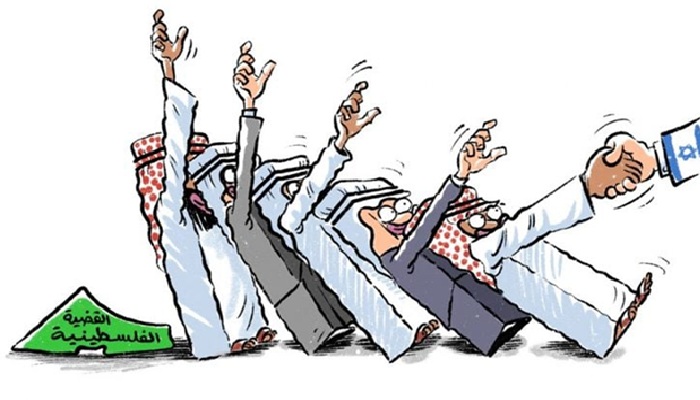
The psychological and moral barrier of the Arab citizen was broken, and the "Overton Window" transformed the discourse from the "taboo" area to the areas between "acceptable" and "acceptable to discuss."
Afrasianet - The Arab media in general and the Lebanese media in particular are full of daily questions and discussions about the "path of normalization with Israel" and the public debates in Lebanon are on the surface, headlines such as "Syria preceded us to normalization" why Lebanon does not benefit, or claims that "Lebanon will remain left behind while Syria has joined it and prosperity and investments will be its share", etc.
In reality, what is happening is not just media "gossip" or questions that are asked for the purpose of discussion, but rather an organized campaign that includes well-known tools in the means of communication and the engineering of public opinion, and adopts two basic theories, the "Overton Window" and the "theory of incitement", so what are they and how are they used to engineer public opinion?
The Overton Window
It is a political theory that describes the extent to which public opinion accepts ideas and policies. This window depicts a range of policies that are accepted by the public at a given time, as follows:
1. Acceptable Policies: Normal and widely accepted policies.
2. Policies Acceptable with Caution (Sensible): Acceptable, but may be a bit controversial.
3. Marginally acceptable policies: Not common, but can be discussed.
4. Unpopular policies: They are often rejected, but can be discussed.
5. Extreme Policies : Completely rejected by the vast majority.
This theory is based on the positivity of "How can we move the window to make ideas that were rejected seem acceptable or debatable?". The mechanistic theory proposes the following:
1. Normalization: The extremist idea is frequently presented in public discourse (often via the media or social media platforms).
2. Framing: The idea is reformulated in less extreme language or by linking it to desirable values (prosperity and foreign investments).
3. Endorsement: People with relative credibility or influential accounts (part of the electronic fly network) discuss the idea as if it were a legitimate option ("Why not?" / Is it time to think about it?"
4. Acceptance: With repetition, the idea becomes familiar and gradually enters the "acceptable to discuss" space.
Second- Agitation Theory
This theory focuses on how inflammatory media messages can be used to evoke negative emotions (e.g., fear, anger, hatred, anxiety) in the public to achieve specific goals, such as dismantling social cohesion, undermining trust in institutions, or mobilizing support for a particular policy.
This policy is based on mechanisms, the most important of which are:
1. Repetition: Repeating simple and emotional messages to stabilize an idea in the subconscious mind (we are tired).
Simplification: Turning complex issues into simple binaries (us and them, a culture of life vs. a culture of death).
3. Distortion: Amplifying or minimizing threats according to the desired agenda.
4. Channeling: Channeling anger or flaming fear towards a specific enemy or scapegoat (e.g., social group, party, state).
On this basis, the Overton Window is the long-term strategic framework for changing what society deems "unacceptable," while the theory of incitement is the short-term tactic of creating emotional chaos and breaking resistance to that change.
Third: The issue of normalization with Israel
For decades, normalization with Israel without a just solution to the Palestinian issue was on the far sidelines – the "extreme phase" in official (and Lebanese) Arab (and Lebanese) public opinion, and was equivalent to "betrayal." Quietly, and in stages, the process of moving this window took place in an orderly manner:
1. The first and second phases: its transition from "extremist" to "marginally acceptable," where eclectic terms are promoted: "cooperation for regional stability," or "common interests in the face of common threats" (Iran as a common enemy). It is no longer an expression of "love for Israel," but rather a pragmatic "necessity."
2. The third stage: from "marginally acceptable" to "reasonable": the appearance of media figures and "experts" on major Arab channels asking "bold" questions: "Is it time to reconsider our position?" or "How much did it cost us to reject normalization?" In contrast, cyberflies attack any opponent of this "audacity" and describe him as "wooden", "reluctant", "from the Iranian Revolutionary Guards", etc.
The discourse then shifted to "economy" or "peace for prosperity," focusing on the promised economic benefits (investments, prosperity) and hiding the high price (disenfranchisement, acceptance of land carving out buffer zones, etc.).
3. Stages Four and Fifth: From "Reasonable" to "Rumor" and then "Policy":
The debate here is no longer about "if" normalization, but about "how" to normalize to make the most of it. The debate becomes about the mechanisms of cooperation (tourism, trade, security) rather than moral legitimacy.
Thus, the debate shifts from the realm of rights and sovereignty to the realm of pure material interests, creating a divide between those who think "with their hearts," "objectors," or "woodeners," those who think "with their minds" (those who are in favor of economic prosperity), and those who think in the interest of their countries and their progress, or those who "love life."
As a result, the success of these mechanisms has varied from one country to another in the Arab world, as while the Lebanese are still in the first and third stages, many in the Arab world have moved to the fourth and fifth stages, and the countries that have already normalized have moved to the last stage: "politics." As a result, the psychological and moral barrier of the Arab citizen has been broken, and the "Overton Window" has shifted the discourse from the "taboo" to the areas between "acceptable" and "acceptable to discuss."

